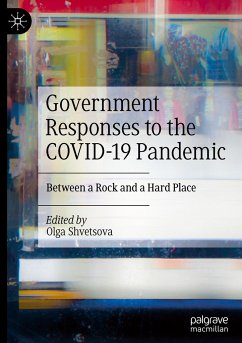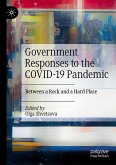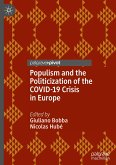This book examines how governments around the world responded to the health emergency created by the COVID-19 pandemic. Before vaccines became available, non-medical interventions were the main means to protect the public. Non-medical interventions were put in place by governments as public health policies. In every nation, politicians and governments faced a choice situation, and worldwide, they made different choices. Public health policies came at a price, in economic, social, and ultimately electoral costs to the political incumbents. The book discusses differences in governments' policy efforts to mitigate the virus spread. The authors conduct in-depth analysis of country-cases from Africa, North and South America, Asia, and Europe. They also offer small-n- comparative analyses as well as report global patterns and trends of governments' responsiveness to the medical emergency. It will appeal to all those interested in public policy, health policy and governance.
Bitte wählen Sie Ihr Anliegen aus.
Rechnungen
Retourenschein anfordern
Bestellstatus
Storno








